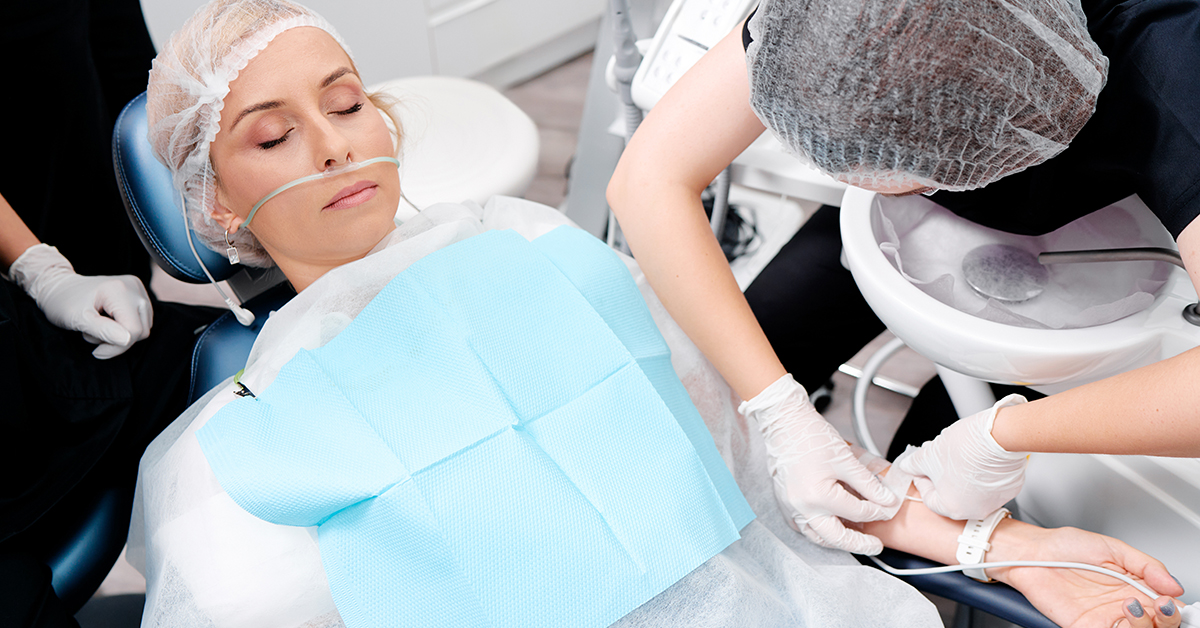Sleep Dentistry

5 Simple Reasons To Consider Sleep Dentistry
If you’re terrified of the dentist, you’re not alone. But fear or phobia shouldn’t stop you from visiting the dentist altogether. Sleep dentistry is a straightforward procedure that allows dentists to treat their patients in a calm, positive, and relaxed atmosphere while asleep. This can be particularly worthwhile for long procedures like wisdom teeth extractions. In this blog, we explore sleep dentistry in detail, including how it can help and its many benefits.
What is Sleep Dentistry?
Sleep dentistry involves using medication delivered by a specialist anaesthetist in a hospital to help patients relax or sleep during dental procedures. This practice is particularly beneficial for individuals who experience anxiety, discomfort, or fear when visiting the dentist. At Mornington Peninsula Dental Clinic, sleep dentistry is performed under general anaesthesia in a private hospital setting, ensuring a safe, calm, and positive atmosphere.
How Can Sleep Dentistry Help?
Sleep dentistry is designed to alleviate the stress and anxiety associated with dental visits. By allowing patients to sleep through procedures, it eliminates the need to experience any discomfort or fear during treatment. This approach is particularly useful for:
- Patients with dental phobia or severe anxiety
- Those undergoing lengthy or complex procedures
- Individuals with a low pain threshold or sensitive gag reflex
- Children who find it challenging to remain still for extended periods
By choosing sleep dentistry, patients can receive necessary dental care without the emotional and physical distress that might otherwise deter them from visiting the dentist.
What Are Some Common Procedures Undertaken During Sleep Dentistry?
Most procedures can be carried out while a patient is under general anaesthetic, including:
- Wisdom teeth removal
- Implants
- Scaling/Cleaning teeth
- Multiple extractions
- Fillings
What Are the Benefits of Sleep Dentistry?
There are a range of benefits to consider when it comes to sleep dentistry, including:
- Stress-Free Experience: Patients can undergo dental procedures while asleep, making the experience completely stress-free.
- Increased Comfort: Sleep dentistry ensures patients remain comfortable throughout the procedure, free from any sensations of pain or discomfort.
- Enhanced Safety: The process is overseen by highly trained and experienced dentists and anaesthetists, ensuring that patients are in safe hands.
- Efficient Dental Care: Long and complex procedures can be performed in a single session, reducing the need for multiple visits, which can be stressful and more expensive.
- Better Outcomes: With patients relaxed and still, dentists can perform their work more efficiently and accurately, leading to improved treatment outcomes.
What Are the Risks Associated with Sleep Dentistry?
Typically, it’s a straightforward and safe process when administered by a licensed healthcare provider. However, as with any procedure involving general anaesthesia, there are some possible short-term risks associated with sleep dentistry, including:
- Lingering Drowsiness: People experience anaesthesia differently. Some may feel groggy and drained after a procedure. In most instances, this won’t last for more than a few days.
- Dry Mouth: It’s not uncommon to wake up after a procedure with a dry mouth and sometimes even a mild sore throat. These symptoms shouldn’t last more than a few hours.
- Nausea and Vomiting: Post-anaesthetic nausea and vomiting are the most common post-operative complaint and can occur in 20-30% of patients. This is unlikely to last for more than a day.
- Difficulty with Side Effects: It can be harder to predict the impact of oral sedation medications. While allergies are rare, they can occur at times. However, other drugs can counteract these issues.
Most of these potential risks or side effects are minor and short-term. However, if you have any concerns about them or experience symptoms for longer than expected, please speak with your dentist or another health professional.
Who Should Consider Sleep Dentistry?
Sleep dentistry offers a viable solution for those who experience significant anxiety or discomfort during dental visits. By providing a stress-free, comfortable, and safe environment, visits performed under general anaesthesia ensure patients can receive the dental care they need without fear or pain. Whether you need routine cleanings or complex procedures, considering sleep dentistry could be the key to maintaining your oral health and overall well-being.
Conveniently, sleep dentistry is also safe for children. However, if you are pregnant, sleep dentistry normally isn’t recommended.
How Long Will I Take to Recover?
Recovery times will vary depending on the procedure you’ve had done, how long you were under, and how your body typically reacts to anaesthesia. Typically, we advise people to take at least 24 hours before they return to daily activities like school or work. However, this again may vary depending on how you react afterward and the procedure you’ve had done.
What Costs Are Involved?
If you are using Mornington Peninsula Dental Clinic for your procedure, we will provide you with an estimate of the cost at the time of consultation. You can then consult your private health insurer regarding the rebate you will be entitled to. If you’re seeking treatment elsewhere, we suggest you ask your dentist for a fee schedule.
You can eat and drink immediately after your appointment. However, you may choose to wait until the numbing sensation has worn off.
For more information on sleep dentistry and how it can benefit you, visit the Mornington Peninsula Dental Clinic. Our experienced team is dedicated to providing a calm, positive, and relaxed atmosphere for all patients.